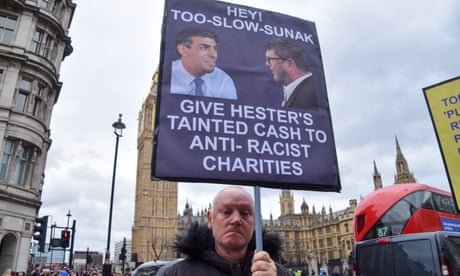British voters are restless, angry and demoralised and more than half of them are pessimistic about the future, according to polling that a counter-extremism organisation has said shows warning signs of future unrest.
More than one in four respondents (43%) described the UK as “declining”, just 6% agreed that the political system was working well and 79% said politicians “don’t listen to people like me”.
The findings are contained in the latest annual report on extremism in Britain released by Hope Not Hate (HNH), which warns that the radical right is growing in confidence as it attempts to push what the campaign group called “divisive, populist, anti-immigration, climate-sceptic policies”.
Nick Lowles, HNH’s CEO, said: “The sense of pessimism and declinism that is very evident in our polling is likely to lead to a change in government. But at the same time this very same mood could turn on a new administration if it is not seen as delivering meaningful change quickly, and this could open the door for an increasingly confident radical right – either from a more rightwing Conservative party or an outside populist movement.”
In other findings that prompted HNH to ask whether Tory voters were “falling out of love with democracy”, 48% of people intending to vote Conservative at the next election said they would prefer “having a strong and decisive leader who has the authority to override or ignore parliament” over “having a liberal democracy with regular elections and a multiparty system”.
A third of those who took part in the 25,000-person poll by Focaldata thought that “in certain circumstances violence can be necessary to defend something you strongly believe in”.
Tories should give up £10m Frank Hester donation, most voters say
The report, which monitors activities of groups and individuals ranging from neo-Nazis and conspiracy theorists through to MPs on the right of the Conservative party and Reform UK, found that anti-migrant activism continued to dominate the far right last year.
Anti-migrant activity monitored by HNH researchers rose by 20% compared with 2022 levels, which were the previous highest on record, while there was an 18-fold increase in anti-migrant demonstrations from 2022.
A record number of far-right activists and sympathisers were convicted of terror-related offences in 2023. Their average age was 32, and four were teenagers.
Noting the rise in antisemitism and anti-Muslim hatred in the UK since the Hamas attacks on Israel and Israel’s offensive in Gaza, HNH noted that the far right was divided on the issue, with some prioritising antisemitism and others attacking Muslims.
The organisation also highlighted the role of what it described as narratives perpetuated by the UK’s political leadership, and criticised what it said was a lack of a clear plan from the government for what to do about far-right extremism.
Misbah Malik, HNH’s senior policy and engagement officer, said: “The last few years in particular have seen the Conservative party sliding to the right. Unsurprisingly therefore, almost immediately after the conflict escalated in October, the political mainstream jumped to propagate a narrative that lazily but dangerously draws from Islamophic tropes.”
Other sections of the polling found that the conflict in the Middle East had deeply divided public opinion in the UK, although a majority of people did not take one side over another, answering “do not care” or “don’t know”.
Only 38% of the public choose a side, according to the research, with 22% siding with the Palestinians and 16% with Israel. A little more than 20% said they supported both sides equally, while 27% said they supported neither side. The rest said they didn’t know.





